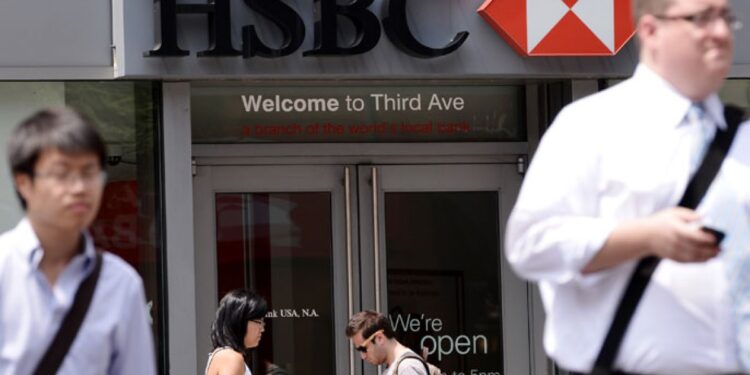In light of the continued repercussions of the trade war led by US President Donald Trump, global banks were subjected to a violent tremor, with a combined loss of more than 700 billion dollars of their market value within one week, according to the Bloomberg Agency report on April 7, 2025.
Although the financial services sector is officially excluded from customs duties, the markets have not mercy on banks, amid increasing fears of possible economic stagnation and slowdown in investment activities.
Loan disorder
The share of the HSBC Bank declined to a decrease in its market value of about 30 billion dollars to the lead of losses, amid fears that its focused activity in Asia will be affected by a severe impact on the escalation of the trade conflict.
In Goldman Sachs, the gap between the actual arrow price and the target price of analysts has expanded to its highest level in more than a decade.
As for GB Morgan Bank, it witnessed a volatile circulation, after its CEO Jimmy Damon stated that the bank would retain a greater part of its profits instead of distributing it, given the “many risks facing the global economy.”
“The market interacts in a reflexive manner,” said analyst Chris Marinak of Jani Montgomery Scott.
The report stated that the heads of a number of banks held an emergency meeting on Sunday to discuss the repercussions of customs duties on the global economy, according to informed sources.
Investment banks in the crisis goal
According to Bloomberg, banks that rely heavily on investment banking services, such as Goldman Sachs, Morgan Stanley, Ceffries and Evekor, are facing serious challenges as general offering operations and merging and acquisition deals.
Morgan Stanley analysts have reduced their forecast for Goldman Sachs, considering that the investment bank activity “rapidly interacts with the risk of stagnation and the deterioration of the market conditions.”
Tomosh Nidzl, an analyst in Bloomberg Intelligence, says that HSBC and Standard Chartard are the most exposed to shocks of fees due to their great dependence on the financing of trade in the Asian market. He explained that 60% of Standard Chartered Bank’s transnational revenues last year, or about 7.3 billion dollars, are now at risk due to the escalation of fees on Asia economies, which range between 17% for the Philippines and 46% for Vietnam.
Buret expectations for markets and profits
It is expected that major American banks such as GB Morgan and Wales Vargo will announce the results of the first quarter on Friday. Analysts expect the results to include an increase in net deletion, but view will be directed at their future expectations for reserves against bad loans.
In his annual message, Damon told investors: “All these fluctuations may take years to become clear … We always hope the best, but we are ready for all scenarios.”
As expectations increase in the American economy slipping towards recession or even the inflationary recession (Stagglichon), this tremor in the banking sector shows the fragility of the global financial system in front of the transformations of American commercial policy.



